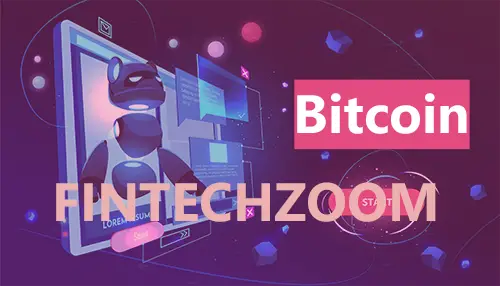Bitcoin: Revolutionizing Fintechzoom Landscape
- Introduction to Bitcoin
- Definition and Origin
- The Rise of Bitcoin in Fintechzoom
- Adoption in financial technology
- Impact on traditional banking
- Bitcoin’s Role in Financial Inclusion
- Access to banking services
- Empowering the unbanked
- Bitcoin’s Impact on Global Economy
- Disrupting traditional financial systems
- Potential for economic growth
- Regulation and Legal Frameworks
- Government policies and regulations
- Compliance challenges for fintech companies
- Security Concerns and Solutions
- Risks associated with Bitcoin transactions
- Strategies for safeguarding assets
- Future Outlook and Predictions
- Evolution of Bitcoin in fintech
- Potential challenges and opportunities
- Conclusion
1. Introduction to Bitcoin
Bitcoin, introduced in 2009 by an anonymous entity known as Satoshi Nakamoto, revolutionized the concept of currency by introducing a decentralized digital currency system. Unlike traditional currencies, Bitcoin operates on a peer-to-peer network, enabling secure and transparent transactions without the requirement for middlemen.
Bitcoin, the pioneering cryptocurrency, has garnered significant attention in the world of finance. Its integration with financial technology (fintech) has led to transformative changes in traditional banking systems and financial transactions. In this article, we dive deep into the intersection of Bitcoin and fintechzoom, exploring its evolution, impact, challenges, and future prospects.
Bitcoin’s journey within the fintech industry has been nothing short of remarkable. Its inception as a dispersed digital currency has challenged conventional notions of money and finance. As it continues to gain popularity, the debate surrounding its viability and long-term impact increases in quantity.
2. The Rise of Bitcoin in Fintechzoom
Bitcoin has been welcomed by the fintech sector as an innovator who is using blockchain technology and its decentralized structure to simplify financial transactions. From digital wallets to blockchain-based payment solutions, Bitcoin has become integral to the evolution of fintech, challenging the dominance of traditional banking systems.
The Evolution of Bitcoin in Fintechzoom
The evolution of Bitcoin within the fintech sector has been marked by innovation and adaptation. From its early days as an experimental currency to its current status as a global phenomenon, Bitcoin has undergone significant transformations.
-
Adoption by Financial Institutions
In recent years, traditional financial institutions have started to recognize the potential of Bitcoin and blockchain technology. Major banks and investment firms are exploring ways to incorporate Bitcoin into their services, ranging from custody solutions to investment products.
-
Integration into Payment Systems
The integration of Bitcoin into payment systems has accelerated its mainstream adoption. Companies like PayPal and Square now allow users to buy, sell, and hold Bitcoin directly within their platforms, blurring the lines between traditional finance and cryptocurrency.
-
Emergence of Decentralized Finance (DeFi)
Bitcoin’s influence extends beyond traditional banking into the domain of decentralized finance (DeFi). DeFi platforms leverage blockchain technology to offer a wide range of financial services, including lending, borrowing, and trading, without intermediary firms.
3. Bitcoin’s Role in Financial Inclusion
One of the most significant impacts of Bitcoin in fintech is its role in promoting financial inclusion. By providing access to banking services through mobile devices and internet connectivity, Bitcoin has empowered individuals in underserved regions to participate in the global economy. Moreover, it has facilitated cross-border transactions, reducing the barriers to financial access for the unbanked population.
Challenges and Opportunities Ahead
Despite its rapid growth and widespread acceptance, Bitcoin faces several challenges that could shape its future path within the fintech industry.
1. Regulatory Uncertainty
Regulatory uncertainty remains a significant hurdle for Bitcoin and other cryptocurrencies. Governments around the world are battling with how to regulate digital assets effectively, leading to fragmented regulatory frameworks and compliance challenges for businesses operating in the space.
2. Scalability Issues
Scalability has been a persistent challenge for Bitcoin, limiting its ability to process transactions quickly and efficiently, especially during periods of high demand. Solutions such as the Lightning Network aim to address scalability issues by enabling faster and cheaper transactions off-chain.
3. Environmental Concerns
The environmental impact of Bitcoin mining has come under investigation due to its energy-intensive nature. Critics argue that the carbon footprint of Bitcoin mining operations is unsustainable and incompatible with global efforts to combat climate change. As a result, there is growing pressure on the industry to transition towards more sustainable mining practices.
4. Bitcoin’s Impact on the Global Economy
Bitcoin’s strange potential extends beyond fintech, impacting the global economy at large. As a decentralized currency, it challenges the power of central banks and traditional financial institutions, offering an alternative store of value and medium of exchange. While people raise concerns about its volatility and regulatory uncertainties, proponents see Bitcoin as a catalyst for economic growth and innovation.
5. Regulation and Legal Frameworks
The incorporation of Bitcoin into the fintech domain has triggered regulatory examination and demands for all-encompassing legal structures. Governments worldwide are battling with the challenge of regulating digital currencies while balancing innovation and consumer protection. Compliance with anti-money laundering (AML) and Know Your Customer (KYC) regulations poses significant challenges for fintech companies operating in the Bitcoin ecosystem.
6. Security Concerns and Solutions
Despite its potential benefits, Bitcoin transactions are liable to security threats such as hacking and fraud. The decentralized nature of the blockchain offers inherent security features, but users must adopt best practices to safeguard their assets. Implementing robust encryption techniques, multi-factor authentication, and cold storage solutions can mitigate the risks associated with Bitcoin transactions.
7. Future Outlook and Predictions
The future of Bitcoin in fintech remains dynamic and uncertain, with ongoing debates about its scalability, governance, and environmental impact. While some imagine Bitcoin as the future of money, others see it as a speculative asset with limited utility. Nevertheless, technological advancements such as the Lightning Network and developments in regulatory frameworks are poised to shape the evolution of Bitcoin in fintech.
8. Conclusion
In conclusion, Bitcoin’s integration into the Fintechzoom landscape has brought into a new era of financial innovation and inclusivity. Despite regulatory challenges and security concerns, Investors remain optimistic about the possibility of disruption, to entrepreneurs, and consumers alike. As Bitcoin continues to evolve, its impact on fintechzoom and the global economy is poised to deepen, shaping the future of finance in unprecedented ways. Its decentralized nature and blockchain technology have challenged traditional financial systems and paved the way for a more inclusive and transparent financial future. As Bitcoin continues to evolve, its impact on fintech and the global economy will become more pronounced. While challenges such as regulatory uncertainty and scalability remain, the underlying potential of Bitcoin to revolutionize finance cannot be ignored.
Unique FAQs
Q. Is Bitcoin legal?
A. Bitcoin’s legality varies by jurisdiction. While some countries have embraced it as a legitimate form of currency, others have imposed restrictions or outright bans.
Q. How can I buy Bitcoin?
A. You can purchase Bitcoin through cryptocurrency exchanges, peer-to-peer platforms, or Bitcoin ATMs using fiat currency or other cryptocurrencies.
Q. What is blockchain technology?
A. Blockchain is the underlying technology behind Bitcoin and other cryptocurrencies. It is a decentralized ledger that records transactions across multiple computers in a secure and transparent manner.
Q. What are the risks of investing in Bitcoin?
A. Investing in Bitcoin carries inherent risks, including price volatility, regulatory uncertainty, and security threats. It is essential to conduct thorough research and exercise caution when investing in cryptocurrencies.
Q. Can Bitcoin replace traditional currencies?
A. While Bitcoin has the potential to disrupt traditional currencies, its widespread adoption as a medium of exchange faces challenges such as scalability, regulatory hurdles, and volatility.

